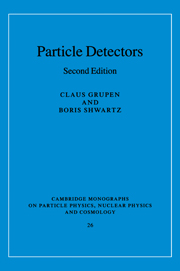Book contents
- Frontmatter
- Contents
- Preface to the second edition
- Preface to the first edition
- Introduction
- 1 Interactions of particles and radiation with matter
- 2 Characteristic properties of detectors
- 3 Units of radiation measurements and radiation sources
- 4 Accelerators
- 5 Main physical phenomena used for particle detection and basic counter types
- 6 Historical track detectors
- 7 Track detectors
- 8 Calorimetry
- 9 Particle identification
- 10 Neutrino detectors
- 11 Momentum measurement and muon detection
- 12 Ageing and radiation effects
- 13 Example of a general-purpose detector: Belle
- 14 Electronics
- 15 Data analysis
- 16 Applications of particle detectors outside particle physics
- Résumé
- 17 Glossary
- 18 Solutions
- Appendix 1 Table of fundamental physical constants
- Appendix 2 Definition and conversion of physical units
- Appendix 3 Properties of pure and composite materials
- Appendix 4 Monte Carlo event generators
- Appendix 5 Decay-level schemes
- Index
4 - Accelerators
Published online by Cambridge University Press: 19 October 2009
- Frontmatter
- Contents
- Preface to the second edition
- Preface to the first edition
- Introduction
- 1 Interactions of particles and radiation with matter
- 2 Characteristic properties of detectors
- 3 Units of radiation measurements and radiation sources
- 4 Accelerators
- 5 Main physical phenomena used for particle detection and basic counter types
- 6 Historical track detectors
- 7 Track detectors
- 8 Calorimetry
- 9 Particle identification
- 10 Neutrino detectors
- 11 Momentum measurement and muon detection
- 12 Ageing and radiation effects
- 13 Example of a general-purpose detector: Belle
- 14 Electronics
- 15 Data analysis
- 16 Applications of particle detectors outside particle physics
- Résumé
- 17 Glossary
- 18 Solutions
- Appendix 1 Table of fundamental physical constants
- Appendix 2 Definition and conversion of physical units
- Appendix 3 Properties of pure and composite materials
- Appendix 4 Monte Carlo event generators
- Appendix 5 Decay-level schemes
- Index
Summary
The ‘microscopes’ of the particle physicist are enormous particle accelerators.
American Institute of PhysicsAccelerators are in use in many different fields, such as particle accelerators in nuclear and elementary particle physics, in nuclear medicine for tumour treatment, in material science, e.g. in the study of elemental composition of alloys, and in food preservation. Here we will be mainly concerned with accelerators for particle physics experiments [1–5]. Other applications of particle accelerators are discussed in Chapter 16.
Historically Röntgen's X-ray cathode-ray tube was an accelerator for electrons which were accelerated in a static electric field up to several keV. With electrostatic fields one can accelerate charged particles up to the several-MeV range.
In present-day accelerators for particle physics experiments much higher energies are required. The particles which are accelerated must be charged, such as electrons, protons or heavier ions. In some cases – in particular for colliders – also antiparticles are required. Such particles like positrons or antiprotons can be produced in interactions of electrons or protons. After identification and momentum selection they are then transferred into the accelerator system [6].
Accelerators can be linear or circular. Linear accelerators (Fig. 4.1) are mostly used as injectors for synchrotrons, where the magnetic guiding field is increased in a synchronous fashion with the increasing momentum so that the particle can stay on the same orbit.
- Type
- Chapter
- Information
- Particle Detectors , pp. 82 - 89Publisher: Cambridge University PressPrint publication year: 2008



